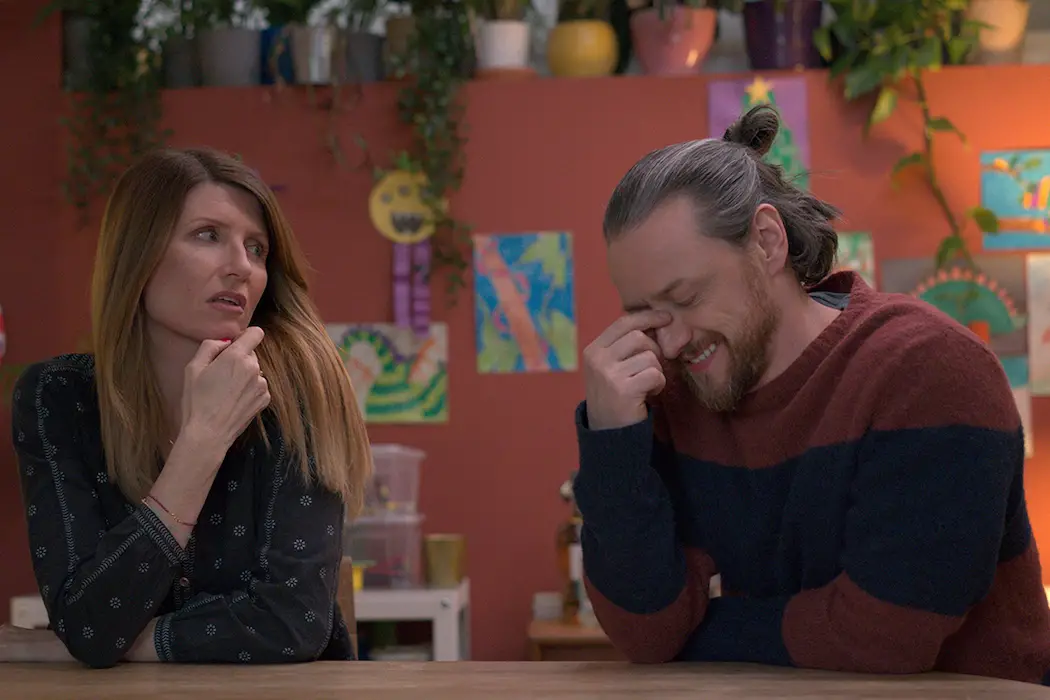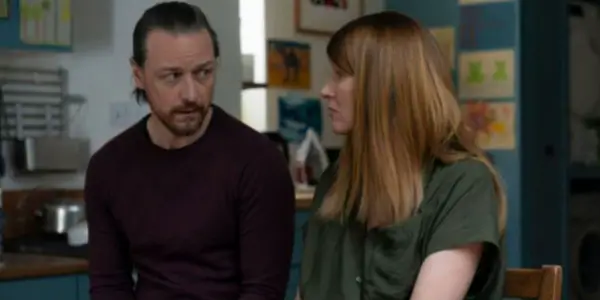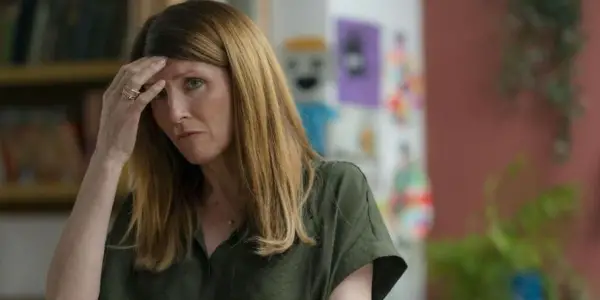TOGETHER: An Unusually Ferocious Lockdown Rom-Com

Andrew Stover is a film critic/writer from the Chicagoland. His…
Ever since the start of the COVID-19 pandemic, filmmakers have generated embellished tales of horror (Rob Savage’s Host), sci-fi (Adam Mason’s Songbird), and theft (Doug Liman’s Locked Down) that surrounded quarantine and the pandemic. Together takes place during the pandemic but keeps the conflict intimate and domestic. Directed by Stephen Daldry and written by Dennis Kelly, Together is an unshrinking exploration of a couple, played by Sharon Horgan and James McAvoy, amidst the pandemic.

Presented by two talented actors in a series of monologues and dialogue-heavy scenes that unfold in a townhouse setting, Together has the appearance and rhythm of a play. Fortunately, under the guidance of Daldry’s clever direction and Kelly’s incisive writing, the film has the verve and realism to compellingly depict the relationship between the unnamed man and woman. The woman is a liberal charity worker who was raised by a dentist father and socialist mother. The Scottish man is more conservative and comes from a working-class family. He runs a consultancy firm that has to do with digital analytics. Opposites attract, right? A pandemic will certainly attempt to answer that very question.
A Lockdown Rom-Com Like No Other
Both characters, now trapped inside with their son Arthur (Samuel Logan) due to the COVID-19 pandemic, are overtly or modestly hostile toward each other. They go after each other’s distinctive habits, views, and personality traits they find insufferable. She questions his political views and hates the way he eats. He thinks she is a priggish liberal. At one point, he bluntly says to her, “I hate your face.” They constantly break the fourth wall and spill their guts to viewers directly. While I’m sure the fundamental plot doesn’t sound too appetizing to viewers who crave escapist entertainment, Together is engaging by virtue of Horgan and McAvoy’s magnetic performances that are surprisingly complex, wounded, and naturalistic.
Daldry begins the movie on March 24, 2020. It was around that time when UK residents were advised to stay home to prevent and control the spread of the coronavirus. For one middle-class couple, the news that they must stay quarantined is dreadful, primarily because they can’t stand each other, at least that’s what one would gather after listening to their brisk interactions during the hammy introduction. The introduction is uncomfortable and brash, yielding snippets of off-color dialogue like, “I actually think of him as a cancer.” And in fourth-wall-breaking fashion, the couple bombards the audience with insults pertaining to their romantic partner. There is a high probability that audiences will decide to quit watching then and there. Truthfully, as the film progresses, so does the depth of the dialogue and the performances.

Initially, the relationship between the man and woman is characterized by how much, or how little, they actually see one another. But the pandemic tests the durability of their relationship when they are forced to spend the majority of their days with one another. Dennis Kelly’s screenplay is pithy and insightful, capturing the realities of quarantine and being a couple on polar sides of the political and social sphere. Resentment and hate erode the foundation of their relationship, repressing the love that once existed without inhibition. Yet, the foundation of their relationship interestingly remains.
Unforgettable Performances
Stephen Daldry documents the couple from March of 2020 to March of 2021. Dates and COVID-19 fatalities are displayed on-screen throughout to establish the passing of time, which kind of takes away from the nuances of the couple’s involved relationship that is seemingly deteriorating or flourishing due to close proximity. Horgan and McAvoy are capable of providing clues — whether it be a gaze, a gesture, or a line delivery — that can clue viewers into the current state of their relationship. While plastering the coronavirus fatalities reinforces the devastation of the pandemic, Daldry’s drama is solely domestic, concerned with the fluctuating emotions and fervid beliefs of the fussy leads without validating them. Viewers are merely observers left to draw their own conclusions about the strength and toxicity of their relationship, especially when compared to others.

Together is compiled of monologues and confrontations that are either brutally forthright or curiously hypocritical. McAvoy and Horgan talk fast, going through every monologue and interaction with scarily precise and pained body language. It helps that both actors are given dialogue that subverts how a bitter argument or lovely anecdote ends up morphing into something completely unexpected. A heated disagreement can show shades of choler and rancor one moment, but then shades of warmth and regret the next. Through the shameless bickering and lowbrow insults, there are pure moments of sentiment that ring true thanks to McAvoy and Horgan being versatile performers. Horgan shines in a monologue that revolves around the woman’s indisposed mother who is alone in the hospital. McAvoy‘s character, now listening and trying to comfort her from afar, stands motionless as Horgan‘s character tells the genuinely heartbreaking story of her mother’s final moments. That scene, in particular, lingers long after the credits have rolled because the writing and acting from both leads is emotionally raw and incredibly timely, even more so than other scenes that concern the emotional turmoil of the pandemic.
Daldry and Kelly perfectly encompass the uncertainty, claustrophobia, and boredom of the past year. The man grows a man bun and develops a habit of growing vegetables. In one scene, McAvoy’s character mentions how nobody, not even politicians, knows what they are doing. In another scene, Horgan’s character talks about how not enough efforts are put in place to protect elderly patients in care centers. Yet, despite their relatability and valid concerns, the characters are not wholly likable. They judge each other and they criticize others without acknowledging their own hypocrisy. But are those traits unique to them and not to real people? I don’t think so. An incident involving a poisonous mushroom comes up a couple of times, and alarming confessions are made that shock and bewilder, leading to an ending that is quite surprising yet weirdly endearing.
Together: Conclusion
Stephen Daldry’s Together is a fast-paced domestic drama that is fiercely comical, wantonly awkward, and sneakily poignant. In any romantic relationship, there is sex, commitment, and compromise. But there are no specific guidelines to follow to secure the long-term success of any romantic relationship, let alone in a pandemic. Supported by Sharon Horgan and James McAvoy’s masterful performances Together resonate with real-life and offer no clear-cut guideline to do love correctly. The star couple of Together don’t even know but their persistence to make it work is somewhat admirable and outrageous, and it is a kind of love that may or may not be worth enduring.
Have you seen Together? If not, are you interested in seeing Together? Let us know in the comments!
Together was exclusively released in theaters on August 27, 2021, by Bleecker Street.
Watch Together
Does content like this matter to you?
Become a Member and support film journalism. Unlock access to all of Film Inquiry`s great articles. Join a community of like-minded readers who are passionate about cinema - get access to our private members Network, give back to independent filmmakers, and more.
Andrew Stover is a film critic/writer from the Chicagoland. His film & TV reviews can be found on Film Inquiry & Film Threat.













